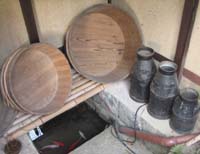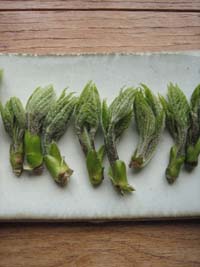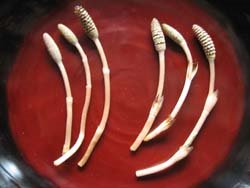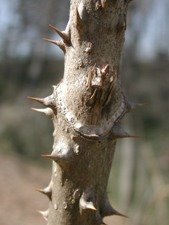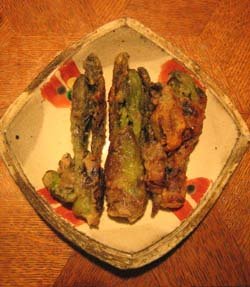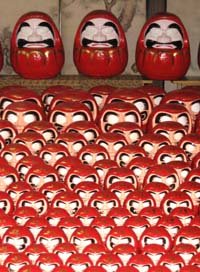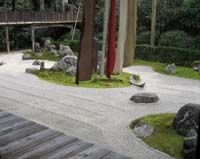| PureLandMountain.com |


Site Feed
The Blog Brothers
Talk on the Wild Side 
Old-fashioned kitchen sink
JapanFocus
Self-Winding
SlowFood
SolarCooking
Simple Living
Backwoods Home
PRwatch
The Night of the Flaming Marshmallows
Hira Hakko
Twin Toddlers Take No Prisoners
Japanese Garden Database
TheAuthorsGuild
InTheHeartland
Wired for Books
aLibris
David Bull
Roots Music
Edge
HealthOnTheNetFoundation
HowardStern
Pioneer Thinking
Gempler's
Japanese Garden Database
Herbs2000
EricGower
PandasThumb
Natural Dyeing
MoveOn
AltWeeklies
|
Sunday, April 30, 2006
Posted
Sunday, April 30, 2006
by Robert Brady
Sansai gatherers don't really like to share their secrets with stranger sansai gatherers, which is understandable, but we were clearly such rank amateurs that one of them took a pro-sansai gatherer's pity on us (while the other kept on gathering) and explained that this was a koshiabura tree (Acanthopanax sciadophylloides Franch. et Savat), that the buds were delicious as tempura, that the slightly opened leaf clusters were delicious boiled and served with a touch of bonito shavings and soy sauce, and that a side dish of koshiabura would cost a fortune in an exclusive restaurant. They also explained how to recognize the tree among all the others that looked sort of like it. (We didn't tell him that we've been seeking the koshiabura bush in vain for a couple of years now and had begun to think it must be extremely rare.) So after thanking them and going our separate ways we went off looking for more of the tree, found quite a few just at the right stage and filled our bag with the pungent buds and leaves (sort of a mild celery/butterbur combo fragrance). When we got home, for lunch we had some of the larger leaf clusters boiled and topped with bonito shavings and soy sauce. Delicious mild flavor, with a unique and delightful semi-crunchy mouthfeel, sort of a cross between broccoli and spinach. After lunch we looked at the book we'd gotten our only image from, compared it with what we'd gathered and seen: the stem in the photo was much darker and speckled, unlike the actual item, which moreover wasn't undergrowth, as we'd assumed from the picture, but a tall slender tree. Once you get to know them, trees are more instructive than books about trees. 0 Pure comments Thursday, April 27, 2006
Posted
Thursday, April 27, 2006
by Robert Brady
2 Pure comments
Posted
Thursday, April 27, 2006
by Robert Brady
5 Pure comments
Posted
Thursday, April 27, 2006
by Robert Brady
Mick just posted Twilight of the Trolley on The Blog Brothers, sent me right back there... 0 Pure comments Wednesday, April 26, 2006
Posted
Wednesday, April 26, 2006
by Robert Brady
3 Pure comments
Posted
Wednesday, April 26, 2006
by Robert Brady
Milk's a must for mums-to-be Only one headline had gotten the elemental fact of the matter right: Vit D linked to baby birth weight. Simply that. Seems more and more like the dead-tree media, under threat from bloggers and the internet in general, are increasingly resorting to scary tabloid-type headlines, much as the dairy industry is resorting to recombinant Bovine Growth Hormone (rBGH). Vitamin D intake was the key point to the story, not milk. So why all the emphasis on milk? In Canada (where the study was done), milk is fortified with vitamin D, but there are plenty of other sources of that vitamin, none mentioned in these articles. Milk of any kind is fundamentally an unnatural food for adults, to say nothing of cow's milk for pregnant humans and their babies... So I wondered why all the scare headlines: why all this obvious pushing of milk on a trusting (?) audience? How unbiased was this study, anyway? So I went to the study itself and waaay at the very bottom was this statement: "Funding sources for our study included the Dairy Farmers of Canada..." Oh. Oddly, in all this deeply heartfelt journalistic concern for mothers and their infants, none of the news articles mentioned a study on, say, bi-weekly shots of rBGH, or the use of other hormones and antibiotics to keep cows alive and producing, not a word on Monsanto ('Holy Mountain,' ironically), sewage sludge in cow feed, or all the many other detrimental aspects of milk; nor did they refer to non-organic milk. Let alone the famous Milk Letter. 0 Pure comments Tuesday, April 25, 2006
Posted
Tuesday, April 25, 2006
by Robert Brady
0 Pure comments
Posted
Tuesday, April 25, 2006
by Robert Brady
3 Pure comments Monday, April 24, 2006
Posted
Monday, April 24, 2006
by Robert Brady
Today I observed the first of the Springtime bird parties around here, when the birds really go wild. The party starts when the farmers flood and harrow their paddies, one by one down the mountainside. Today it was the paddy across the road. Hearing all the avian commotion, I left breakfast and stepped out on the deck to behold a couple dozen hawks, wings wide, swarming the air directly over the paddy, doing their lazy lacework just above the farmer as he harrowed slowly back and forth with his small tractor. Now and then a hawk would swoop down and snatch a grub or a frog from the freshly turned mud that had lain fallow for eight months. Over in the far trees some egrets were watching from the sidelines, waiting for the farmer to leave. Darkly prominent at the scene were a bunch of crows, who weren't dining at the moment (since they can't wade); their only interest was in harassing any hawks that weren't just sitting on the paddy banks watching with sharp beaks and talons at the ready. When the farmer finally left, the egrets stepped in and slowly stalked the fresh buffet, selecting breakfast while the hawks kept gliding, swooping and grabbing at the sky-colored water, the crows now and then selecting a particular airborne hawk and closely following him around from above as he scanned the water, then at just the right moment swooping down and mussing up the hawk's hair. When the hawks had had their fill and glided off into the rest of the air, the crows' fun was done so they left too, leaving the paddy mirror to the slow-motion egrets who, now having the serendipitous banquet all to themselves, took their long-legged graceful time until the entire paddy had been thoroughly enjoyed. Tomorrow morning comes the next party, one venue lower. 2 Pure comments Sunday, April 23, 2006
Posted
Sunday, April 23, 2006
by Robert Brady
3 Pure comments Saturday, April 22, 2006
Posted
Saturday, April 22, 2006
by Robert Brady
0 Pure comments
Posted
Saturday, April 22, 2006
by Robert Brady
2 Pure comments
Posted
Saturday, April 22, 2006
by Robert Brady
0 Pure comments Friday, April 21, 2006
Posted
Friday, April 21, 2006
by Robert Brady
3 Pure comments Thursday, April 20, 2006
Posted
Thursday, April 20, 2006
by Robert Brady
7 Pure comments Wednesday, April 19, 2006
Posted
Wednesday, April 19, 2006
by Robert Brady
2 Pure comments Tuesday, April 18, 2006
Posted
Tuesday, April 18, 2006
by Robert Brady
2 Pure comments Monday, April 17, 2006
Posted
Monday, April 17, 2006
by Robert Brady
0 Pure comments Sunday, April 16, 2006
Posted
Sunday, April 16, 2006
by Robert Brady
3 Pure comments Friday, April 14, 2006
Posted
Friday, April 14, 2006
by Robert Brady
6 Pure comments
Posted
Friday, April 14, 2006
by Robert Brady
4 Pure comments Wednesday, April 12, 2006
Posted
Wednesday, April 12, 2006
by Robert Brady
5 Pure comments Posted Wednesday, April 12, 2006 by Robert Brady 0 Pure comments Tuesday, April 11, 2006
Posted
Tuesday, April 11, 2006
by Robert Brady
3 Pure comments Posted Tuesday, April 11, 2006 by Robert Brady 0 Pure comments Monday, April 10, 2006
Posted
Monday, April 10, 2006
by Robert Brady
0 Pure comments Sunday, April 09, 2006
Posted
Sunday, April 09, 2006
by Robert Brady
4 Pure comments Saturday, April 08, 2006
Posted
Saturday, April 08, 2006
by Robert Brady
SPONTANEOUS MEDITATION Walking around the corner of the house early this morning into the full gold of sunlight I was caused to stop in my tracks, close my eyes and breathe deeply as in spontaneous meditation, mind emptied of thought and filled with a clear sense of nirvana here and now. I had walked all unexpecting into the heaven of fragrance shared by the Myrtle bush, every gleaming purple facet hinting at the beauty that bears us to each morning. When I came back to this world, it was new. 0 Pure comments Friday, April 07, 2006
Posted
Friday, April 07, 2006
by Robert Brady
2 Pure comments Thursday, April 06, 2006
Posted
Thursday, April 06, 2006
by Robert Brady
8 Pure comments Wednesday, April 05, 2006
Posted
Wednesday, April 05, 2006
by Robert Brady
RAINY NIGHT EPIC Last night I stepped out onto the deck in the whisper of new Spring rain and heard, in the rainfilling rice paddy across the road, the first two or three fresh-from-the-mud frogs of the year singing in top form - their voices clearly invigorated by their long sleep - about how amazing it was to be out here in the dark of the larger world once again, so rich in water above and below, just as it was last time they were here together in this very same place of long tradition, wasn’t it a delight their songs went, recounting once more the ever-astonishing adventure of having spent another dark instant of winter under the soil, which had clearly only recently been tilled, though they didn’t remember a thing about that; yet they’d all survived to gather here once more and sing the ancient tales to one another in calls and responses, just as their forefrogs had done all the way back to the beginning of everything there ever was and ever would be, as it has long been told. They sang on even as I was later falling asleep and lost track of the lyrics. No doubt they went on all night and exhausted themselves, for the morning was all sunlight and only the manic warbler was singing. But there's no keeping that kind of spirit down; I went out there tonight and they were at it again, in even greater numbers and louder than ever, singing once again the epic tales they never tire of. 2 Pure comments Tuesday, April 04, 2006
Posted
Tuesday, April 04, 2006
by Robert Brady
2 Pure comments Monday, April 03, 2006
Posted
Monday, April 03, 2006
by Robert Brady
4 Pure comments Sunday, April 02, 2006
Posted
Sunday, April 02, 2006
by Robert Brady
6 Pure comments Saturday, April 01, 2006
Posted
Saturday, April 01, 2006
by Robert Brady
7 Pure comments

|
